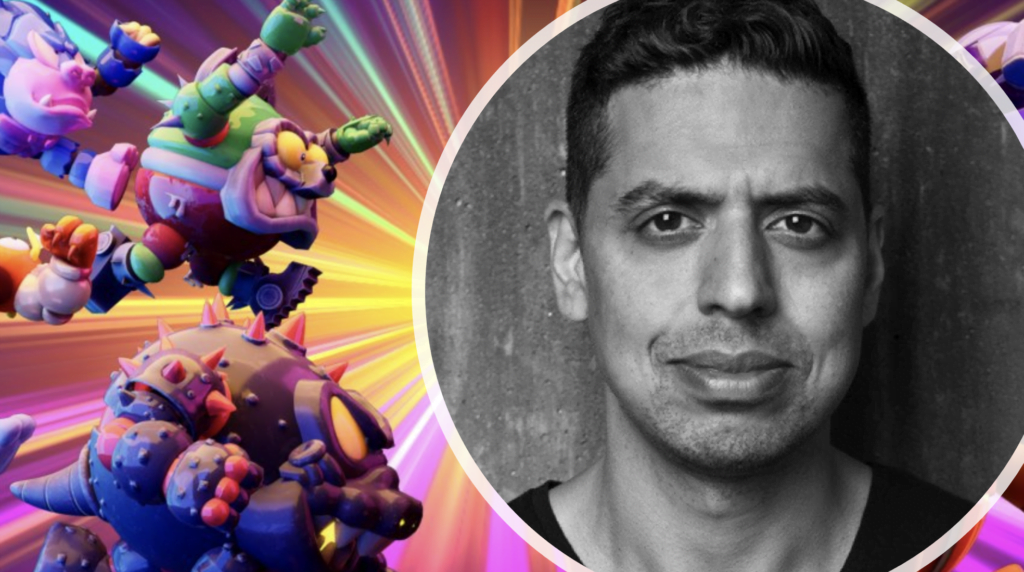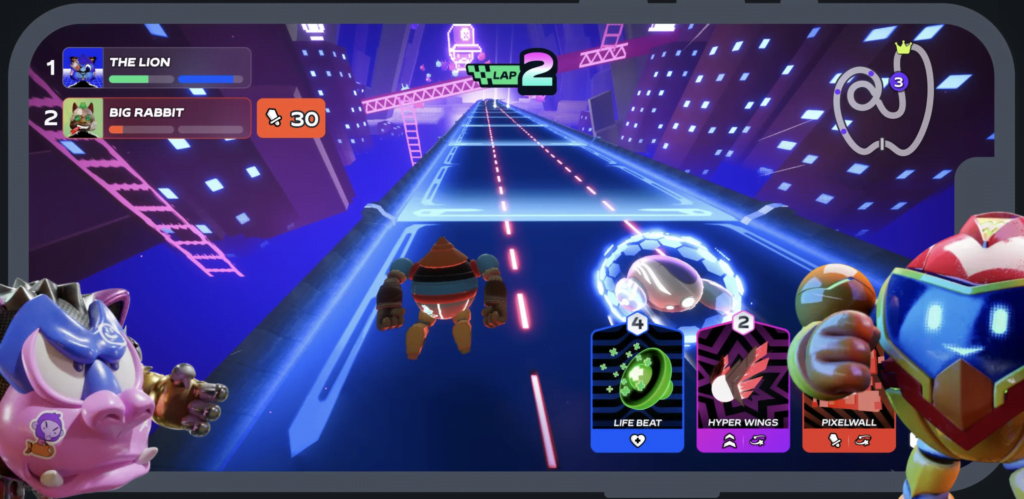MixMob is marking its presence in the blockchain gaming domain, offering a mix of racing gameplay, DeFi and NFT elements, and the chance for players to earn money while playing and spectating. One of those spearheading the project is Pavel Bains, Executive Producer at MixMob, who has a diverse background, including roles at Disney Interactive, EA, Xbox, and Nintendo. In this detailed interview, Bains discusses the game’s concept and core technologies, Web3 gaming as a new category, the recently launched MXM token, key future developments, and more.
Can you describe the main concept behind MixMob and its approach to Web3 gaming?
Pavel Bains: For blockchain games, you need to make a game that appeals to the crypto native. They want to have fun, make money, and speculate. It’s not about AAA games or adding blockchain to a title. MixMob is Mario Kart with real money gaming and a touch of DeFi. It’s easy to pick up and play but difficult to master. This is because it has a card strategy element to it.
Our players are gamers, gamblers, and degens. They can be one, two or all three. You can choose to race against others and earn prize money. You can spectate and wager on racers. And if you are into DeFi, we’ve turned our racing arenas into liquidity pools that they can optimise yield on.

In your strategy to ‘Flip Web2,’ how does MixMob plan to change minds and reshape traditional gaming?
Pavel Bains: We have no plans to change their minds. Gaming now has different segments: console gaming, mobile gaming, AAA, mid-core, casual. To me, Web 3 gaming isn’t about getting traditional gaming over, it’s about creating a new category, similar to what mobile did over 10 years ago.
Web 3 gaming is a new category where the players want to make money, speculate, own their assets and have fun. Though this is niche for now, it has a high average spend per player, and the numbers will only grow.
With a development team experienced in AAA titles, how does this expertise translate into MixMob’s game design and user experience?
Pavel Bains: AAA experience means you have the skills to work with different personalities, build on different types of tech, and develop games of all sizes. This allows us to be more efficient and effective in making MixMob for the target audience.
Can you tell us more about the expected impact of the newly launched MXM token on the MixMob gaming ecosystem, such as revenue sharing, DeFi, and governance?
Pavel Bains: Our objective is to create a full-game economy where MXM is the center. We are launching the MXM Esports League, and we want MXM holders to have a say in it. I watch NBA, FIFA, and F1, I’d love to have a say in how they grow. We want our community to have the same. MXM is a real governance token as you get to govern the league and decide on things like where to hold live championships, the number of divisions, teams per division and more.
As MXM holders you can stake in the racing arenas you like and partake in the rewards earned in that arena, very similar to the DeFi product GMX.

Where and how can players get their hands on MXM tokens?
Pavel Bains: Right now, there are three ways to earn the upcoming MXM launch:
1. Participate in the community challenges. Join our Discord and learn how and when to do these. You earn our in-game token SUD$, and these will be swapped for MXM later.
2. Play in our current incentivized beta. Our game is in the same stage as layer 1’s used to have incentivized testnets. Play MixMob: Racer 1 and execute its features as racing, wagering, referrals and earn more SUD$. Trade these for MXM later.
3. Buy our upcoming MixBot NFTs. These are Mario Kart-like characters which not only have special cosmetic traits but also racing traits. By having one of the first-generation MixBots, you will be able to receive an MXM airdrop.
What are some of the core technologies behind MixMob, and how do they enhance the experience for gamers?
Solana Blockchain: Solana’s speed of transactions and low costs provide the experience gamers are looking for.
The MixMob Wallet: We created our own gasless wallet solution, which is more secure, private and far more user-friendly. Users can purchase our in-game tokens and NFTs via credit card.
Cross-Platform Play: MixMob allows for multiplayer cross-play between iOS, Android, and Web Browser users. This increases player reach as people can play against each other from any device.
Soulbound Tokens: MixMob has created its in-game token, SUD$, as a Soulbound token, which means players cannot transfer SUD$ to one another. It can only be exchanged with the MixMob wallet. The benefit is that it prevents market forces, i.e. exchanges, from affecting the token economy.
NFT Crafting: MixMob has created a crafting system that allows multiple NFTs to be delivered as one, where players get to burn it and uncover other NFTs, which can then be fused to create a final desired NFT.
Cheating Protection: We implemented an anti-cheat mechanism that makes modification of game results impossible by running a game simulation in Photon Quantum simultaneously with the player’s games.

Some major investors are backing MixMob. How will their influence and investment propel the game’s success post-launch?
Pavel Bains: Our investors have been very supportive and patient for the past two years. They are all excited to have a game come out that can be the Axie of Solana. Once we launch, I’m sure they will be excited to tell everyone about MixMob and connect us with partners who can increase distribution and awareness to attract more players.
With MixMob currently in beta, can you share the biggest wins the game has achieved since development began back in 2022?
Pavel Bains: In April 2022, we launched our first Alpha – a complete racing arena for a single player only 3 months after starting. In September 2022, we added multiplayer.
In January 2023, we added another racing arena along with spectator and wagering mode. This was the biggest feature request when we were having the game played live 3 months prior.
In April 2023, we went to GDC and got an excellent reception from game devs who loved how we combined racing and card strategy – thus creating a new genre.
October 2023 got acceptance of our beta build into the test modes of both iOS and Android. Our game was designed for mobile, and though our alpha and beta desktop versions have good numbers, we know mobile will blow them away.
Looking forward, can you tell us about the full game launch and some key future developments planned for MixMob?
Pavel Bains: Moving forward, MixMob is progressing towards full commercial release which includes the following and more:
Altcoins – Allowing other cryptocurrencies to enter the Arenas. These bring more communities who can then launch Turbo Arenas for their own currency.
Racing Crews – Teams created around specific game items and player-defined criteria. Players stake MXM to establish a Crew and collaborate to win rewards, which are then shared proportionally to each player’s stake.
Themed Tracks & Boosts – Launched during holidays or special events, these come with unique rewards and gameplay mechanics and can boost player participation.
Turbo Arenas as NFTs – Stakers can create and vote to modify the parameters of fees, wins, losses, rewards, etc. to affect the economy of Turbo Arenas which then can be sold/moved to other players.
User-Generated Content – players can remix their NFTs and can upload their own assets to be sold as accessories and add-ons with their own characters or with other players.
The success of MXM and the MixMob economy through the first game, MixMob: Racer 1, lays the foundation for the development of the next game, MixMob: Uprising – a multiplayer battle arena, similar to Fortnite that leverages all the assets and IP from the first title.





















































































order cheap clomiphene without prescription where can i buy cheap clomiphene get clomid without rx buying clomid without dr prescription can i order clomiphene pills how to buy generic clomid without prescription how to get cheap clomiphene without prescription
This is the make of post I unearth helpful.
This is a theme which is virtually to my heart… Myriad thanks! Quite where can I notice the connection details in the course of questions?
zithromax 250mg without prescription – buy generic ciprofloxacin metronidazole usa
semaglutide tablet – cheap cyproheptadine buy generic periactin
domperidone 10mg usa – buy sumycin 250mg online cyclobenzaprine 15mg ca
order amoxicillin pills – combivent 100mcg tablet combivent 100mcg tablet
buy augmentin 625mg generic – atbioinfo purchase ampicillin generic
generic nexium – https://anexamate.com/ esomeprazole 20mg over the counter
purchase coumadin pill – https://coumamide.com/ losartan brand
order meloxicam 15mg without prescription – mobo sin meloxicam over the counter
order deltasone 10mg online cheap – https://apreplson.com/ deltasone 20mg pills
ed pills online – fast ed to take erectile dysfunction pills over the counter
order amoxicillin for sale – https://combamoxi.com/ amoxil tablets
buy diflucan pills for sale – fluconazole canada buy diflucan 100mg without prescription
cenforce without prescription – cenforce drug order generic cenforce
tadalafil generic cialis 20mg – https://ciltadgn.com/# over the counter cialis walgreens
cialis tubs – https://strongtadafl.com/ cialis generic overnite shipping
ranitidine 300mg us – https://aranitidine.com/ order ranitidine 300mg pills
sildenafil citrate 50mg price – https://strongvpls.com/# buy viagra discount
I couldn’t resist commenting. Profoundly written! on this site
More text pieces like this would urge the интернет better. https://ursxdol.com/levitra-vardenafil-online/
More articles like this would make the blogosphere richer. https://prohnrg.com/product/acyclovir-pills/
This is a theme which is in to my heart… Numberless thanks! Faithfully where can I upon the connection details in the course of questions? https://aranitidine.com/fr/acheter-propecia-en-ligne/
This is the gentle of writing I truly appreciate. https://ondactone.com/simvastatin/